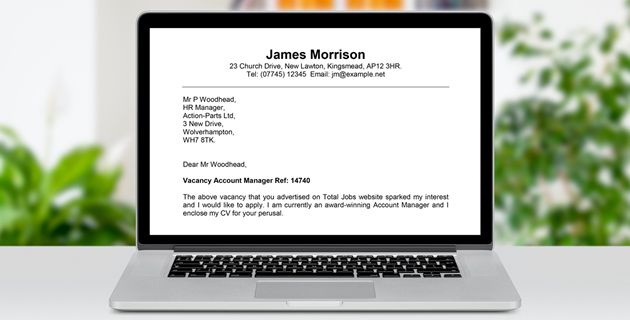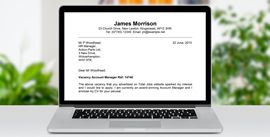Do You Still Need to Send a Cover Letter When You Apply For a Job?

You can share this article by clicking on the buttons below:
Today's article focusses on cover letters and you're about to:
- Learn whether you need to write a cover letter when you're applying for jobs online or directly with employers or recruiters.
- Find out what happens if you don't send a cover letter when you're applying for a job.
- Discover how you can create a cover letter that really stands out and makes an employer or recruiter want to interview you.
Do you think you need a cover letter?
- As you're probably mainly applying for jobs now by email or by using a form on either a job site or an employer's website, you may feel that there is no longer any need for a cover letter.
- When you're sending an email, do you just say the equivalent of "Here's my CV" or "Please find my CV attached to this email".
- Or when you apply via either a job site or employer's website, you may feel that all you need to do is upload your CV, because it says that the cover letter is optional.
But, will you miss out if you don't include a cover letter?
- A cover letter gives you an extra opportunity to communicate your true worth to an employer (or recruiter) and it can therefore make your application and your CV stand out from all the other applicants if you get it right.
- A great cover letter can command an employer's attention, especially if there are 100s of other applicants for the job.
- Of course, you'll still need a great CV to accompany your cover letter, but a good cover letter can really help, as it can put you ahead of all the other applicants at the start and make the employer really want to read your CV.
What happens if you don't send a cover letter?
- Failing to send a cover letter makes it look like you're not really interested in the job itself, because you couldn't be bothered to write a cover letter, and it makes employers question whether they should bother with your application.
- You'll miss out on an opportunity to show exactly how your skills, experience and achievements match the requirements of the job, which is vital if you want to convince an employer that they should interview you.
- If there are 100s of other applicants, not sending a cover letter will put you at an even greater disadvantage, as the more savvy candidates will go to the trouble of writing a cover letter, as they know how important they are.
- Not sending a cover letter can therefore be a wasted opportunity to impress an employer and get ahead of your rival applicants.
Always include a cover letter with your CV
- A cover letter really is vital these days, because employers and recruiters receive so many CVs, which means that a well-written cover letter / email will make you stand out.
- Sending a cover letter shows you've thought about the job, and how you and your skillset could fit into the role and the company itself and how you could add value, which will make an employer / recruiter want to interview you.
- It also says to the employer that I really want this job, as I've gone to the trouble of producing a cover letter or of course you may have paid someone else to produce it (but an employer won't be able to tell this, only you'll know).
- Sometimes instead of an optional cover letter, some websites have an optional box that you can fill in - treat this as your cover letter.
- When you're emailing your CV to an employer or recruitment consultant for an advertised job vacancy, then your email itself becomes the cover letter.
- Never treat a cover letter as optional, always include one, otherwise you'll be missing out on a great opportunity to impress an employer, get ahead of your competitors and secure that vital job interview.
How can you create a cover letter that really stands out and makes an employer / recruiter want to interview you?
Here's Bradley CVs top 10 tips to create a great cover letter:
- A cover letter is your introduction to your CV, so you must clearly state how your skills and experience match an employer's requirements and why an employer should consider you for the job rather than all the other applicants.
- Keep the layout clear and simple, try and keep the paragraphs fairly short and in general keep your cover letter to just one page - remember they've got to read your CV too, so they won't want to read a long cover letter.
- When applying for an advertised vacancy, always read the job advert thoroughly several times and make a list of all the key skills and experience that are required by the employer, this should be your starting point.
- At the beginning of your cover letter summarise in just one paragraph the relevant experience, skills, aptitudes, strengths, etc, that you possess that an employer has asked for in the job advert.
- You then follow this with up with further paragraphs (or bullet points if you prefer) that show how you've added value at your previous employers and demonstrated the skills and experience required in the job advert.
- Your cover letter must sell you, but in a nice way, so focus on your relevant achievements / results and make the employer / recruiter feel that you've specially selected them and that you really want this job.
- Your last paragraph should sum up why you are the right person for the job, what value can you add and say specifically why you'd be better than all the other applicants and why you should be invited for the interview.
- If you email your CV directly to a recruitment consultant, keep your email to a few short paragraphs and sell yourself very quickly - you must make them want to open your CV, otherwise they'll just move onto the next email.
- When you're making a speculative approach to an employer (where you don't know if there's a vacancy), your cover letter needs to work even harder than normal, so state clearly what role/s you'd be interested in at the very start.
- Your cover letter must work in tandem with your CV, and must highlight the most relevant information on your CV, especially if there's something vital on page 2 or 3 that may easily be missed if you fail to mention it in your letter.
Share This Article
If you enjoyed this article, then please share it by clicking on the buttons below:






